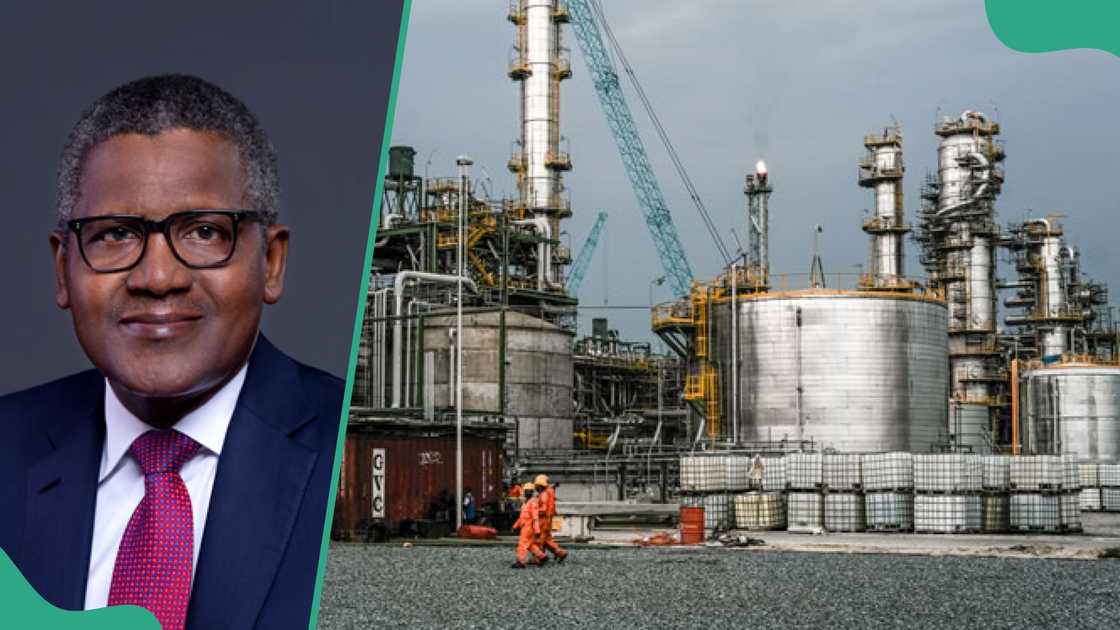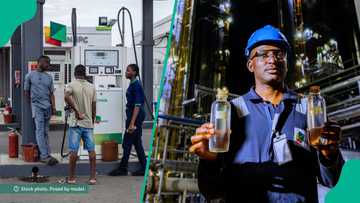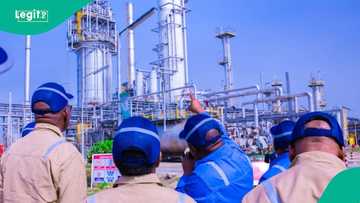Dangote Refinery Targets 650,000bpd Output by June, Eyes Crude Imports to Bridge Demand
- Dangote Refinery has revealed plans to increase its production capacity by another 30% before June 2025
- This move will see the refinery move from producing 500,000 barrels of petroleum product daily to 650,000
- There are also plans to import crude oil to meet the demand, as the crude allocation from the NNPC would not suffice
Don't miss out! Join Legit.ng's Sports News channel on WhatsApp now!
Legit.ng journalist Ruth Okwumbu-Imafidon has over a decade of experience in business reporting across digital and mainstream media.
The Dangote Petroleum Refinery has revealed plans to import additional crude oil to supplement supplies from the Nigerian National Petroleum Company Limited (NNPCL), which have proven insufficient to meet fuel production needs at its $20 billion facility in Lagos.
According to refinery officials, production has already increased to approximately 500,000 barrels per day (bpd), with a target of reaching the full capacity of 650,000 bpd by June 2025.

Source: Getty Images
While the naira-for-crude agreement, introduced by President Bola Tinubu last year, remains in effect, sources within the facility have indicated that crude imports will be necessary to meet the refinery's production goals.

Read also
Cost of imported petrol crashes below Dangote's price, filling station owners set to make a decision
These sources spoke anonymously to the PUNCH, citing a lack of authorisation to address the media.
The NNPC already has challenges supplying 350,000 barrels per day (bpd) from the 450,000 bpd allocated for domestic consumption to support the Dangote Refinery’s 650,000 bpd capacity.
With the refinery currently producing 500,000 bpd, officials emphasised the necessity of sourcing additional feedstock from international markets to maintain and expand operations.
They clarified that the issue is not NNPC's inability to supply crude but getting the required volume to bring production up to full capacity.
Crude supply stretched with NNPCL refineries onstream
With more refineries coming onstream and the expansion of Nigeria’s refining capacity, it becomes even more pertinent to source crude elsewhere as the 450,000 barrels of crude oil allocated for local refineries is now insufficient to meet growing demand.
Data from the Nigerian Upstream Petroleum Regulatory Commission (NUPRC) showed that the Dangote Refinery, the Port Harcourt Refinery, and six others will collectively require 770,500 barrels per day to sustain fuel production.
The Nigerian Midstream and Downstream Petroleum Regulatory Authority (NMDPRA) data shows that the country's combined refining capacity of functional refineries is 974,500 barrels per day, demonstrating the need to source crude elsewhere.
Based on crude oil production forecasts from the Nigerian Upstream Petroleum Regulatory Commission (NUPRC), the Dangote Refinery will require 550,000 barrels of crude daily. This equates to 17.05 million barrels per month and approximately 99.55 million barrels between January and June 2025.
Opac Refinery needs 5,000 barrels per day (bpd), Waltersmith requires 4,500 bpd, Duport Refinery 2,000 bpd, and Edo Refinery 1,000 bpd. Additionally, Aradel Refinery will need 7,000 bpd, Port Harcourt Refinery 60,000 bpd, Warri Refinery 75,000 bpd, and Kaduna Refinery 66,000 bpd to sustain their operations.
The sources stated that Dangote Petroleum Refinery is one of the largest in the world, and it needs to reach full capacity to compete maximally. He noted that there are already talks of the refinery activities affecting the PMS market in Europe due to the reduced need for imports.
Dangote Refinery produces Euro5 standard
Commenting on the burn rate of petrol produced by the Dangote Refinery, a consultant explained that the production adheres to the Euro 5 standard, which ensures premium quality.
He stated that Nigerians can also notice the difference in the burn rates.
Dangote Refinery builds eight new tanks
In related news, Legit.ng reported that the Dangote refinery had built 8 new tanks to expand its crude oil storage.
These tanks amount to about 1 billion litres or 6.29 million barrels.
The management said this move was necessary due to the inconsistent local supply of crude and the need to start importing crude to ramp up production.
As the refinery gradually ramps up production, it has become a favourite to Nigerian consumers who applauded the burn rate.
Proofreading by James, Ojo Adakole, journalist and copy editor at Legit.ng.
PAY ATTENTION: Сheck out news that is picked exactly for YOU ➡️ find the “Recommended for you” block on the home page and enjoy!
Source: Legit.ng




